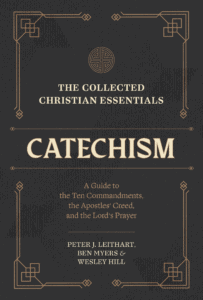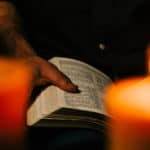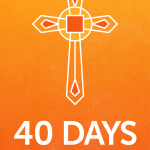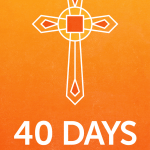

The forty days of Lent are a time for pondering and praying the life of Jesus—in particular, “he suffered under Pontius Pilate, was crucified, died, and was buried.” In his death and suffering, we find life. When we know Christ and the power of his death and resurrection, we also share in the fellowship of his sufferings (Phil 3:10). There’s joy hidden in suffering with Christ. “You have died, and your life is hidden with God” (Col 3:3).
When we’ve run out of words—whether because of sorrow or happiness—God gives us his own words, because God’s word interprets us, our lives, our worries, and our joys. “The Spirit himself intercedes for us with groanings too deep for words” (Rom 8:26). And so, since ancient times, Christian worship has been defined as receiving God’s word and speaking God’s word back to him. This order and logic undergirds the Daily Office: the twin services of Morning and Evening Prayer (also called Matins and Vespers).
We have adapted an Order of Prayer and a daily Bible-reading plan from Catechism: A Guide to the Ten Commandments, the Apostles’ Creed, and the Lord’s Prayer. This small pamphlet of prayer and Bible-reading is an invitation to Lent.
Claim your free Lenten reflection guide:
Order of Prayer
This Order of Prayer is a simplified version of the Daily Office. The English version of the Daily Office is mediated through the Book of Common Prayer. The sixteenth-century English Reformer Thomas Cranmer streamlined the eight prayer offices of the medieval church into two and rendered them in common English for common Christians. Thanks to Cranmer, all are now welcome to enjoy the hallowed tradition of praying psalms and verses.
This order of prayer has five parts: (1) Invocation, (2) Confession and Forgiveness, (3) the Service of the Word, (4) Prayer and Thanksgiving, and (5) Benediction. These five parts invite us into God’s word, which brings God present with all his gifts of forgiveness, salvation, and life, and they send us out into the world with words of faith, hope, and love.
- Prayer begins with the Invocation, the speaking of God’s name, because God promises to be present in his name and word.
- In Confession and Forgiveness, we tell the truth: we have fallen short of God’s law by sinning against him and our neighbors; and we hear God’s promise of forgiveness and the declaration of forgiveness.
- In The Service of the Word, we hear God’s word, which is for our instruction, comfort, and hope. God’s word calls us to worship, instructs us, comforts us, and gives us hope; we respond in thanksgiving for God’s word with God’s word.
- In Prayer and Thanksgiving, we ask our merciful God for his mercy; we confess who he is and what he has done and continues to do, and we pray as he taught us.
- In the Benediction, we praise and thank God, blessing those present with God’s name.
This order of prayer can be prayed individually; just read all the text as if you were reading a book. It can also be used by a group—with a leader speaking the plain text, and the group responding with the words in bold. The psalms and songs can be read in unison or in response—with a leader reading up to the asterisk and the group reading the line after the asterisk.
Lectionary
This daily Bible-reading plan (or lectionary) is ordered around the church year. The church measures its days and seasons by our Lord and Savior Jesus Christ. Because the church year walks through Jesus’ life, death, and resurrection, the church year has two center points: Jesus’ birth (Advent, Christmas, and Epiphany) and Jesus’ death and resurrection (Lent, Easter, and Pentecost). Just as the sun orders our ordinary calendar, Jesus is the sun of the Christian calendar.
Each day has two readings—often, but not always, an Old Testament and a New Testament reading. You can read them together. You could read just one. You could read one in the morning and one in the evening. You could also read them along with the 30-day Psalter (p. 15), in which case you would begin with the psalm readings.
Jesus—in his birth, life, death, resurrection, and ascension—absorbs our days and interprets them according to his life, forgiveness, and salvation. Each day and season focuses on part of the second article of the Apostles’ Creed, “I believe in Jesus Christ his only Son our Lord.” But every day is filled with all of Christ: “you crown the year with your bounty” (Ps 65:11).






